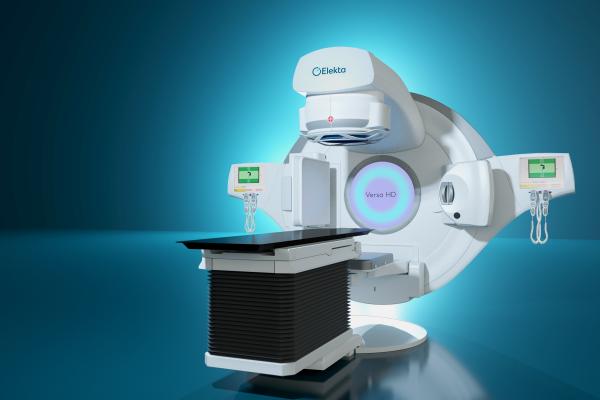
September 14, 2017 – The program for the 2017 Annual Meeting of the American Society for Radiation Oncology (ASTRO), Sept. 24-27 in San Diego, will feature advances in cancer research, including reports from phase II and III clinical trials. Studies that examine innovative treatments, such as immunotherapy, mental health influences on cancer outcomes, and optimal radiation dosing and sequencing, will also be presented at the largest meeting for the field of radiation oncology.
The meeting is expected to attract more than 11,000 attendees to the San Diego Convention Center. Researchers selected for the press program will share their findings in a series of news briefings and webcast live to registered press. The schedule is as follows:
The Science of Radiation Oncology: Innovative Approaches
Sunday, Sept. 24, 1:00 p.m. – 2:00 p.m. Pacific time; moderator Brian Czito, M.D., FASTRO, Duke University
- “Consolidative radiotherapy for limited metastatic non-small cell lung cancer: A randomized phase II trial,” Puneeth Iyengar, M.D., Ph.D., University of Texas Southwestern (Abstract LBA-3);
- “Phase II 5-arm trial of ipilimumab plus lung or liver stereotactic radiation for patients with advanced malignancies,” James Welsh, M.D., MD Anderson Cancer Center (Abstract LBA-5); and
- “Novel associations between the immune landscape of prostate cancer and post-operative radiation response,” Shuang (George) Zhao, M.D., MSE, University of Michigan (Abstract 3);
Quality Care in Radiation Oncology: Refining Treatments
Monday, September 25, 11:00 a.m. – 12:00 p.m. Pacific time; moderator, Paul Harari, M.D., FASTRO, ASTRO President-elect, University of Wisconsin
- “A phase III trial of pelvic radiation therapy versus vaginal cuff brachytherapy followed by paclitaxel/carboplatin chemotherapy in patients with high-risk, early-stage endometrial cancer: A Gynecology Oncology Group study,” Marcus Randall, M.D, FASTRO, University of Kentucky (Abstract LBA-1).;
- “Two-year results for MC1273, a phase II evaluation of aggressive dose de-escalation for adjuvant chemoradiation in HPV+ oropharynx squamous cell carcinoma (OPSCC),” Daniel Ma, M.D., Mayo Clinic (Abstract LBA-14);
- “Hypofractionated radiation therapy after mastectomy for the treatment of high-risk breast cancer: Five-year follow-up result of a randomized trial,” Shu-lian Wang, M.D., Chinese Academy of Medical Sciences and Peking Union Medical College (Abstract 5); and
- “Long-term results of RTOG 0617: A randomized phase III comparison of standard dose versus high dose conformal chemoradiotherapy +/- cetuximab for stage III NSCLC,” Jeffrey Bradley, M.D., FASTRO, Washington University at St. Louis (Abstract 227).
The Healing Art of Radiation Oncology: Patient Well-being
Tuesday, September 26, 1:00 p.m. – 2:00 p.m. Pacific time; moderator, Brian Kavanagh, M.D., MPH, FASTRO, ASTRO President, University of Colorado
- “Healthcare disparities in cancer patients receiving radiation: Changes in insurance status after Medicaid expansion under the Affordable Care Act,” Fumiko Chino, M.D., Duke University (Abstract LBA-15);
- “Study of total and undiagnosed depression in a cancer patient population at an urban cancer center,” Jason Domogauer, Ph.D., Rutgers University (Abstract 21);
- “The long-lasting relationship of distress on radiation oncology-specific clinical outcomes,” Justin Anderson, Virginia Commonwealth University (Abstract 22); and
- “The patient's perspective on breast radiation therapy: Initial fears and expectations versus reality,” Narek Shaverdian, M.D., University of California, Los Angeles (Abstract 85).
In addition, the meeting will feature keynote addresses from Richard D. Zane, M.D., FAAEM, chief innovation officer for the University of Colorado Health System; Lucy Kalanithi, M.D., FACP, widow of Paul Kalanithi, M.D., the best-selling author of “When Breath Becomes Air,” with Heather Wakelee, M.D., Paul’s oncologist; and Vinay K. Prasad, M.D., MPH, an assistant professor of medicine at the Oregon Health and Science University.
During the four-day meeting, more than 200 exhibitors will demonstrate cutting-edge technology and medical device innovations for radiation oncology.
For more information: www.astro.org


 November 04, 2025
November 04, 2025 









